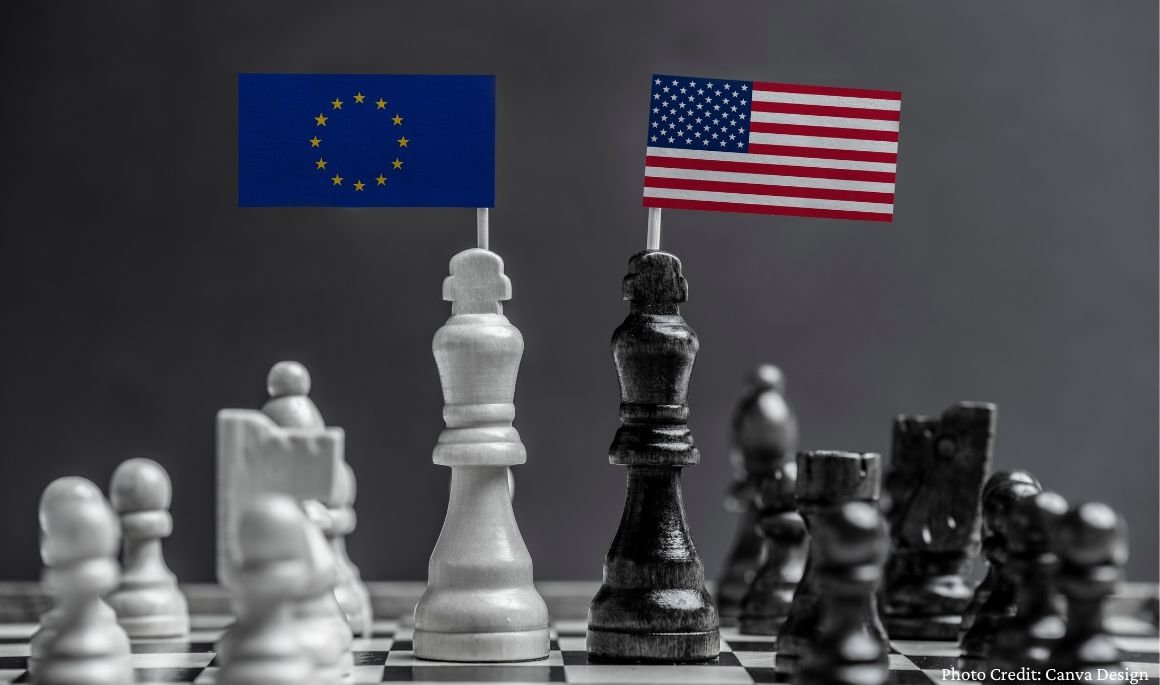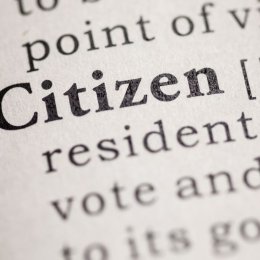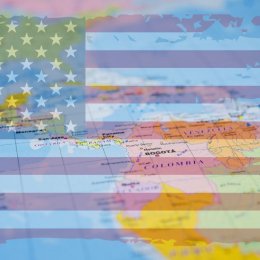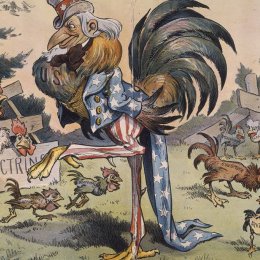- Norwich Blogs
- Blogs
- EU-US Disconnection: How Severe, How Long, and How Fruitful for EU Strategic Autonomy?
EU-US Disconnection: How Severe, How Long, and How Fruitful for EU Strategic Autonomy?
By Dr. Alexis Vahlas
This article examines the growing disconnect between the European Union and the United States, particularly under Donald Trump’s second term, marked by aggressive rhetoric, ideological divergence and unpredictability in foreign policy. Trump’s actions — ranging from insulting allies to threatening annexations — have undermined international law and the global order the U.S. helped build. The EU faces a dilemma: while Trump’s erratic behavior may not last, deeper ideological divides over societal values persist, especially regarding immigration and social conservatism. In response, the EU is accelerating its efforts toward strategic autonomy, strengthening defense cooperation and preparing for scenarios where U.S. support may falter. However, the article argues that rather than abandoning NATO, Europe should reinforce its own security mechanisms while maintaining NATO as the primary defense framework, ensuring complementarity between the two.

Disclaimer: These opinion pieces represent the authors’ personal views, and do not necessarily reflect the official policies or positions of Norwich University or PAWC.
A surprise that should not be
It is surprising to see how much European allies are flabbergasted by the beginning of Donald Trump's second term. All his alarming actions were already demonstrated in his first term. There were brutal accusations: for example, on July 11, 2018, Trump said that "Germany is totally controlled by Russia". There were ideological U-turns, like when he blamed allies for counting too much on the US presence in Europe and being too negative towards Russia. Last but not least, there were objectively false arguments like the famous tweet of July 2018 stating that "All NATO Nations must meet their 2% commitment", whereas the principle was only "to move towards the 2% guideline within a decade", which, at the time, meant by 2024. The true principle is clearly enshrined in the Declaration of the 2014 NATO summit in Wales (§14). The 2% guideline ("2% recommandés" in French version) became an obligation only in 2023, after the Russian invasion of Ukraine.
But it is true that if Donald Trump's foreign policy is not different in nature, it has now reached an unprecedented degree of aggressiveness in the history of the Western alliance. Examples are too numerous to be quoted: insulting Canada's Prime minister by calling him "Governor" and expressing the will to annex its country; expressing the same will to annex a constitutive part of Denmark, letting the Ukrainian leader be insulted in his oval office, even about the fact that he had no tie!
The brutal approach to international affairs
What is even more problematic is the threat to use force that was expressed for a possible US annexation of Greenland and Panama. It contradicts the most important rules of international law: the twofold prohibition to use force and to threaten to use force, as well as the obligation to settle disputes by peaceful means. Therefore, the US did not just stop being the leader of the free world by abandoning Ukraine, a clear case of a state fighting to maintain its freedom and very existence. The US is also destroying the international order it built after World War II by ignoring the principle of sovereignty and the prohibition of aggression.
Is the law of the strongest better for the global superpower? Nothing is less sure, and no one has been more eloquent than Thomas Hobbes on the issue. The author of Leviathan, rightfully perceived as advocating for strong governments, is the best authority to understand why everyone, including the strongest, has an interest in switching from the law of the jungle to a legal order and, a fortiori, why the strongest has the interest to keep a legal order that made him the strongest.
The difficult reversibility of the ideological rift
Hence the question: will Trump’s erratic behavior last? Many hope this second term will see the same evolution observed during the first one. Moderation will prevail after some reality checks, and President Trump will return to more consensual stances and methods. Or, on a still optimistic line, such a situation will not last more than 4 years, and by 2029, everything will come back to normal: the friendship between the EU and the US, strong US involvement in European security, no urgent European need to do more in terms of defense.
But one issue won't go away easily: the ongoing ideological fight between DC and Brussels, even if it is often ignored or downplayed by most European leaders. Indeed, it is easier to depict Trump as a dangerous and inconsistent leader instead of explaining why he can win elections. Many European leaders prefer not to address the ideological success of the US President, especially on the model of society, including woke activism, cancel culture, and transgender fluidity, as well as the immigration challenge. The freedom of expression put forward by Vice-President Vance at the Munich Security Conference 2025 is a different issue because it is based on a very old difference of legal traditions, and there have always been fewer constraints in common law countries than in civil law countries in terms of freedom of expression. In practical terms, you can demonstrate with a nazi flag in the US because it does not incite violence, while in France, it is forbidden because inciting hate is prohibited as such, hence more constraints on freedom of expression.
However, regarding the immigration challenge and the type of society people want to live in, most European leaders underestimate Trump's popularity because they are themselves reluctant to address these issues, despite a growing popular demand for more conservative policies. Today, only Orban's Hungary, Fico's Slovakia, and, to a certain extent, Meloni's Italy are close to Trump's political ideas. But depending on the results in future European elections, the ideological gap between the EU's and the US's dominant values could narrow. Facing similar social problems and inefficient traditional solutions, many EU countries will likely adopt more conservative or neo-conservative policies in the near future. Nevertheless, it may then be too late to fix a relationship that has already become very conflictual. Threats of annexation, trade wars, as well as insults and EU bashing in general, can have long-term effects, especially if the world gets reorganized without or even against US leadership.
The problem of EU strategic autonomy
Any state leader’s first and foremost priority is to prepare their country for the worst-case scenario. So, whatever the rationale of the current EU-US disconnection and its evolution, European leaders will adapt to the new US foreign policy. During the Paris Defense and Strategy Forum held from March 11-13, 2025, many participants agreed that there is a "brutalization of international affairs" characterized by Russia's military actions and US political moves. For Europe, it is often perceived as a conjunction of the Russian threat and the US betrayal. As shown by the March summit in London, it triggers a very important shift in European defense. Who would have imagined that EU leaders from the Czech Republic, Denmark, Finland, France, Germany, Italy, Netherlands, Poland, Romania, Spain, and Sweden, as well as other Western leaders from Canada, Norway, Ukraine, and the United Kingdom, could meet without US participation?
Beyond the commitment to continued support for Ukraine, the discussion is always about European security. Indeed, EU defense is already a reality. Thanks to the experience gathered after the many EU military operations launched since 2003, nearly twenty military operations, i.e. more than any other international organization. Thanks to the collective self-defense clause of article 42.7 of the Treaty on European Union, entered into force in 2009, and similar to the former WEU and current NATO's article 5. Thanks to the Permanent Structured Cooperation and the European Defense Fund, established in 2017. Regarding financial commitments, it is also of interest to note that even when the US President started criticizing European allies at the 2018 NATO summit, they were already spending on defense as much as China and much more than Russia.
The primary role of NATO and the EU as a reinforced fallback solution
As Ottawa can be thankful to Trump for reinforcing Canada's national unity, the EU will also paradoxically benefit from the US president's choice to disconnect from European allies. Now that it is obvious that they could end up alone to face major threats, without the comfort of automatic US involvement, European countries are forced to become more autonomous, with more defense capabilities, with more intelligence sharing, and with more of their own weaponry free from the risk of a US kill switch. This new necessity not only fuels the European defense industry but also brings back together the EU and the United Kingdom. In addition to the (B)regret feeling winning in British polls showing the switch from 'Brexit' to 'Bregret', it looks like there was no Brexit for European security.
Some claim today that NATO is dead and that France was right to push for European defense. The question is not that simple, and as a matter of principle, there will eventually not be such a big change. France is indeed in a very specific situation as a nuclear power with full autonomy, located at the western end of Europe. Paris does not have the same security concerns as those sharing borders with Russia or Belarus, such as Finland or Poland. But all these countries belonging to the EU and NATO want to remain in the most favorable situation because they can activate two different collective security mechanisms. The only problem is that both mechanisms require consensus and can be blocked by one negative vote. That is the reason why, despite the current turmoil and the subsequent reinforcement of European defense, it is not a question of choosing between the EU and NATO, but the will to keep the two. In principle, the situation remains the very same one claimed for years by many European leaders, especially the French President and the EU High Representative for Foreign Affairs and Security Policy: EU strategic autonomy in complementarity with NATO.
On one hand, NATO remains the most powerful military alliance with a much greater potential than the EU if you have to face China and Russia. Moreover, it remains true if you remove the US from the equation due to the military potential of Norway, Turkey, and the United Kingdom. Therefore, as the primary solution for collective defense, NATO will be kept as long as possible and with the hope that the US today or Türkiye tomorrow will honor their obligation if the Musketeer clause is to be activated to protect one ally. On the other hand, in case NATO's Article 5 is neutralized due to discord in the Alliance, the alternative EU collective security mechanism must be ready to be used and as efficient as possible.
Dr. Alexis Vahlas is the director of the University of Strasbourg’s Master Diploma SESII (Security of Europe, Stabilisation & International Intervention) and a former Political advisor to NATO and the EU.



